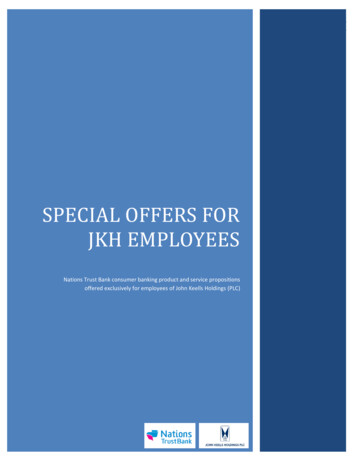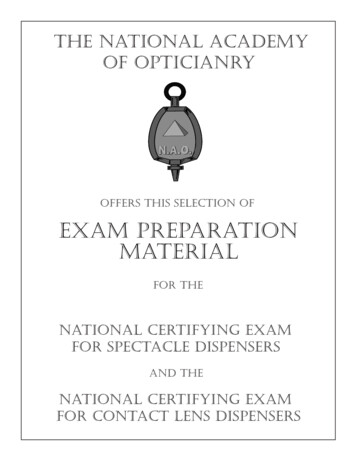
Transcription
Bridging theHealth Insurance GapThe Affordable Care Act offers a prescription for industry change.By Laura Williams-TracyWell ahead of January 2014 when the mostnotable elements of the Patient Protection and Affordable Care Act—specifically,mandatory health insurance coverage—begin in earnest, self storage owners largeand small are preparing their employees forthe changes ahead.While the new law threatens to penalizelarge employers that don’t offer healthinsurance, it’s the uninsured employees ofsmall storage operations—which make up90 percent of all self storage companies—that may face the biggest change in yearsto come.“The law is geared toward the uninsuredand low income people to help them haveaccess,” said Scott Gantt, president ofBenefit Controls of the Carolinas, a benefits, wellness and HR consulting firm withoffices in the Carolinas, Georgia, Tennesseeand Utah. “At the end of the day, the healthcare act is meant to bridge the gap for 44million uninsured.”Within self storage, many of those workingwithout health insurance are at smallerbusinesses that are less likely to offer benefits as mid-sized companies or the muchlarger REITs. According to the Self StorageAssociation, 90 percent of self storage businesses are single facilities run by owner/operators.The Affordable Care Act, which was upheldby the Supreme Court in June 2012, outlinesthat employers with fewer than 50 full-timeemployees are not federally required topurchase health insurance for employees.Dealing with MandatesThat’s good news for those small businessowners, but a mandate that all individualsgain health insurance may create tensionamong owners and employees as the penalties for not having health insurance riseover the years and employees earning atthe lowest levels look to their employer tohelp cover the cost.“The companies that can’t afford it are goingto say, ‘You are on your own’ or ‘We’ll plusup your salary to some degree’ ,” Gantt said.Here are some numbers to see how uninsured self storage employees may beaffected by the new rules.Those earning less than 11,170 in 2012 areeligible for Medicaid.Above that number, individuals earningup to 44,680 or families earning 92,000can qualify for some level of federal subsidybetween two percent and nine percent oftheir income. Individuals and familiesearning above those amounts do not qualifyfor a subsidy. Among those who qualify, thelower the income, the higher the subsidy.For some perspective, a person earning 10an hour during a 40-hour work week—atypical salary for a self storage assistantmanager—would earn 20,800 a year.Based on their income in relation to thefederal poverty level, that person mightearn about a five percent subsidy, or 1,040annually to apply toward the cost of insurance. That subsidy works out to 86 amonth. If the insurance policy costs about 250 a month the worker will pay a 164a-month insurance bill in after-tax dollars.Uninsured workers will find healthcareplans and access to the federal subsidythrough their state’s Affordable InsuranceExchange. The exchanges will work aswebsite portals where uninsured workerscan select between plans and determinetheir level of subsidy. While individualstates are setting up their own exchanges,which virtually assures the rules will bedifferent in every state, the federal subsidyqualifications will be the same in everystate. Exchanges are already functioning inMassachusetts and Utah and are expectedto be online in the remaining states by 2014.See Health Insurance, page 10PA G E 9
Health Insurance, from page 9Storage Owners:Time to ReexamineYour Financial PlanYear-end was an anxious time for storage owners, asthey considered whether to take advantage of attractive gift and estate tax rules that were set to expire atthe end of 2012 and pass some or all of their businesson to family members.Financial planners and estate tax attorneys worked upuntil New Year’s Day when Congress finally came to anagreement on 2013 taxes and avoided the so-calledFiscal Cliff. As it turned out, the estate tax rules madepermanent in the American Taxpayer Relief Act of 2012remain relatively favorable to business owners. The 5 million gift exemption remains, despite the earlierthreat that it could revert to 1 million or just slightlymore. That means storage owners can gift up to 5million of business assets before paying any taxes onthe gift. Over the 5 million mark, gifts are taxed at 40percent, up from 35 percent.“It was down to the wire, and everyone could have seenCongress walk away,” said Beth Wood, an estate taxattorney with the Charlotte, North Carolina, law firmof Moore & Van Allen. “At midnight on December 31we had nothing.”The new law indexes the 5 million exemption, so itgrows each year. In 2013, it’s 5.25 million. The lawalso makes permanent a concept called portability.This means that married couples each receive the 5.25 million exemption and can take advantage of acombined total of 10.5 million in gift and estate taxexemptions, regardless of the way assets may be titled.Under this new law, a surviving spouse may use anyexemption not used by the first spouse to die, if certaintechnical requirements are met, said Wood.Whether or not you transferred interest in your storagebusiness in 2012, the new laws make it a good timeto reexamine your financial plan.“Now that we have permanency, I think it’s a time tostep back and say if I were to die today, do things gowhere I want them to go,” Wood said.By Laura Williams-TracyIn 2014, the first year of the new requirement, uninsuredindividuals that don’t get insurance through an employeror purchase it themselves will face a 95 fine.“The penalties are so low, it will be interesting to see whoreally complies,” Gantt said. But over time, the penaltyis set to rise to 325 in 2015, and 695 or 2.5 percent ofincome, whichever is greater, in 2016.While the subsidies will help—and states are free to addtheir own incentives to help the poorest workers—Ganttsaid paying for insurance will remain a challenge for thoseat the lowest income levels.Robert Raznick, owner of Raznick & Sons Inc. with twostorage facilities in Woodland Hills, California, said thehealthcare law is part of an ongoing set of challenges businesses face, including higher tax rates in his state.But he said the healthcare law isn’t the driving force behindchanges he plans to make to eventually consolidate twopart-time positions into a full-time assistant managerposition. And that full-time employee will receive healthinsurance.“Not offering health insurance has never been somethingI’ve thought much about,” Raznick said. “Managementhas always been offered it or they had it already. I can’timagine too many companies especially in our region thatcan compete without offering it.”David Paradis, part owner of Easy Storage, LLC in Woodburn, Oregon, is the only full-time employee of the facilityand he purchases health insurance for himself.“At this point I don’t see an impact from the law,” Paradissaid. “I go out individually and buy my health insurance.My wife is covered through her employer.”Uninsured PenaltyFor employers with more than 50 full-time employees,there still is no federal requirement that they offeremployees health coverage. But those that don’t will paya 2,000 per employee yearly fine beyond the first 30workers.Several of the large storage REITs don’t expect majorchanges.Public Storage of Glendale, California, already offers healthbenefits to its 5,000 employees and expects no significantchange, said spokesman Clemente Teng.Salt Lake City, Utah-based Extra Space Storage has beenactively implementing provisions of the new health careregulations since 2011, said Bruce Boucher, chief HR officer.“The main impact has been some slight adjustments in thecurrent plan design to ensure compliance with the newregulations,” Boucher said.See Health Insurance, page 12PA G E 1 0 SS A G L O B EMARCH 2013
Health Insurance, from page 10Extra Space offers medical, dental and vision insurance toemployees working 35 hours a week or more.Getting You What You Needto Succeed.Gantt said businesses near the cut-off of 50 full-timeemployees and a number of part-time employees willneed to get clarification from their benefits broker abouthow their employees are counted for compliance with thenew law. An employer with 40 full-time employees and20 part-time employees may be determined by the IRS tohave the equivalent of 50 full-time employees.Larger businesses will need to determine whether the 2,000 fine is a better business decision than purchasinginsurance for employees.According to a 2012 Kaiser Family Foundation report, theaverage premium for an employer-sponsored plan was 5,615 for individuals and 15,745 for family coverage. Anemployer is able to purchase coverage for employees withpre-tax dollars, whereas the 2,000 fine is not deductible.Most self storage operatorsare turning to technologyto take the next step ingrowing their business.PayPros offers technologyto meet the demands oftoday’s modernizing selfstorage industry and tohelp keep you ahead ofthe competition.Use payment technologyto uncover hidden salespotential!Contact PayPros800-513-2579SolutionPros@paypros.comPayPros is a registered trademark of Payment Processing, Inc. 2012 Payment Processing, Inc. All Rights Reserved.Rick Jones, owner of Advantage Self Storage Inc. inMcKinney, Texas, which has 15 facilities and more than 50employees, said his company already offers health insurance but the rising costs require constant considerationof how to offer employees the best plan.“We just struggle every year with the cost,” Jones said.But he adds that not offering the benefit would make hiscompany less competitive.“We have to go to the open market and compete for goodemployees in the Dallas-Fort Worth market where folkscan go work for the large operators and get full benefits,”Jones said. “We made a decision years ago that we wouldprovide healthcare insurance and a 401K. We’re probablya smidge less profitable, but we think it is valuable to investin our people.” vSSA CoreHealth InsuranceLast year SSA, in partnership with MiniCo InsuranceAgency LLC, began offering the SSA CoreHealth Insurance, a limited medical indemnity insurance plandesigned to help people gain access and save moneyon healthcare. The plan provides specific benefitamounts for specific medical care expenses due toaccident or sickness, such as 65 toward a doctor’soffice visit or 250 per day for hospitalization. Any costincurred in excess of the stated benefit amount is theresponsibility of the insured.The plan is not major medical insurance and does notmeet the individual mandate requirements of the newhealthcare law.For more info, visit SSACoreHealthInsurance.com.PA G E 1 2 SS A G L O B EMARCH 2013
fits, wellness and HR consulting firm with offices in the Carolinas, Georgia, Tennessee and Utah. “At the end of the day, the health - care act is meant to bridge the gap for 44 million uninsured.” Within self storage











